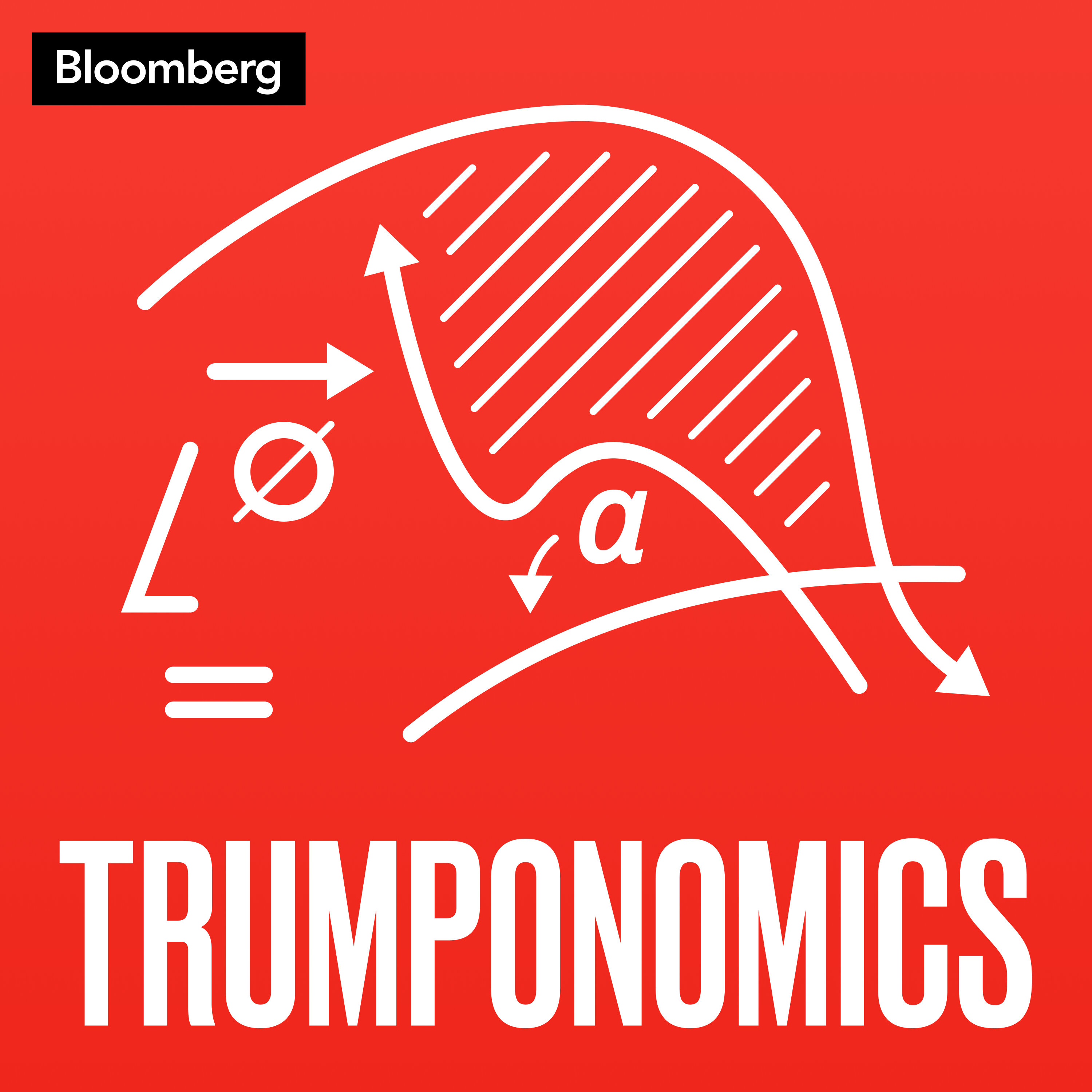

Trumponomics
Bloomberg
Tariffs, crypto, deregulation, tax cuts, protectionism, are just some of the things back on the table when Donald Trump returns to the Presidency. To help you plan for Trump's singular approach to economics, Bloomberg presents Trumponomics, a weekly podcast focused on the Trump administration's economic policies and plans. Editorial head of government and economics Stephanie Flanders will be joined each week by reporters in Washington D.C. and Wall Street to examine how Trump's policies are shaping the global economy and what on earth is going to happen next.
Episodes
Mentioned books

34 snips
Feb 14, 2025 • 23min
Live From Munich: Trump Hands Europe the Bill for Ukraine
Alberto Nardelli, Bloomberg’s Europe correspondent, and Antonio Barroso, senior geoeconomics analyst, dive into the implications of Trump's shifting stance on Ukraine. They discuss Europe's potential $3.1 trillion obligation to support Ukraine amidst fiscal challenges. The conversation tackles the complex dynamics of European security and the ramifications of Trump's negotiations with Putin. They also analyze the EU's struggles to manage trade tensions with the U.S. and the necessity of maintaining international dialogue amidst shifting policies.

21 snips
Feb 12, 2025 • 27min
Scott Bessent’s Uphill Battle Against America’s Debt
Bill Dudley, former president of the New York Federal Reserve and Bloomberg columnist, teams up with Anna Wong, Chief US economist at Bloomberg, to tackle America's mounting debt crisis. They discuss Treasury Secretary's deficit reduction plans clashing with economic realities. The duo dives into the complexities of fiscal sustainability and the impact of rising interest costs. With insights on technology’s role in economic growth and the delicate balance of regulation, they highlight the urgent need for innovative policy actions to navigate the fiscal challenges ahead.

18 snips
Feb 7, 2025 • 29min
Live from NYC: What Is Trumponomics 2.0?
In a dynamic live recording, Nancy Cook, Bloomberg's senior national political correspondent, shares insights from her extensive experience covering Trump. Katie Greifeld, a Bloomberg TV host, and Ed Harrison, senior editor at Bloomberg, delve into the chaotic tariff decisions reshaping trade with Canada and Mexico. They highlight the uncertainty surrounding Trump's economic policies and how the 10-year Treasury rate serves as a key indicator for business leaders navigating these turbulent times. A fascinating exploration of politics intertwined with economics!

20 snips
Feb 5, 2025 • 29min
What Is Trump's Endgame With Tariffs?
Anna Wong, Chief U.S. economist at Bloomberg Economics with ties to the Trump White House, and Sean Donnan, a senior Bloomberg writer focusing on global economics, dive deep into Trump's tariff strategies. They discuss the potential motives behind Trump's trade war tactics and the intricate dynamics with China, Canada, and Mexico. The impact of tariffs on manufacturing and investment is scrutinized, alongside insights into the internal conflicts within the administration affecting their trade policies. It's a compelling exploration of economic unpredictability.

21 snips
Jan 29, 2025 • 25min
How Will Trump’s Immigration Raids Affect American Workers?
Oren Cass, founder of American Compass and author of The Once and Future Worker, joins the discussion on the economic implications of Trump’s immigration policies. He explores how recent immigration raids may reshape labor dynamics and affect American workers. Cass critiques the perception that immigrants are taking jobs, highlighting the necessity of quality employment for all. The conversation also delves into potential reforms in the U.S. immigration system, emphasizing the importance of skilled workers and improved labor conditions.

8 snips
Jan 22, 2025 • 37min
Live from Davos: The Real Conversations Around Trump's Return
In a lively discussion, John Micklethwait, Bloomberg News Editor in Chief, Jenny Leonard, White House reporter, and Brad Stone, Editor of Bloomberg Businessweek, dive into the shifting dynamics at Davos in light of Trump's potential return. They explore how global elites are reconsidering their commitments to social initiatives and the implications of Trump's transactional foreign policy. The group examines the interplay between tech, politics, and corporate strategies, highlighting the financial ramifications for global markets in this transformed landscape.

Jan 15, 2025 • 22min
Does the Bond Market Have It In for Donald Trump?
Anna Wong, Chief US Economist at Bloomberg Economics and former Fed and Trump White House insider, unpacks the bond market's impact on Trump's agenda. She discusses how rising bond yields may challenge economic expectations and deficit spending. Wong also explores the complex policymaking dynamics within the Trump administration and its fraught relationship with the Federal Reserve. Additionally, the conversation touches on the global repercussions of U.S. borrowing costs, illustrating the interconnectedness of today's financial systems.

Jan 8, 2025 • 2min
Introducing Trumponomics
To help you plan for Trump's singular approach to economics, Bloomberg presents Trumponomics, a weekly podcast focused on the Trump administration's economic policies and plans. Editorial head of government and economics Stephanie Flanders will be joined each week by reporters in Washington D.C. and Wall Street to examine how Trump's policies are shaping the global economy and what on earth is going to happen next. New episodes on Wednesdays.See omnystudio.com/listener for privacy information.

Dec 11, 2024 • 26min
Bonus: How Markets Might Be Wrong About Trump
We're back with a bonus episode of Voternomics for your holiday listening. We're tackling the question: what markets might be getting wrong about the President Elect's return to the White House? Stephanie speaks with Anna Wong, Chief US Economist for Bloomberg Economics and Josh Green, National Correspondent at Bloomberg Businessweek.See omnystudio.com/listener for privacy information.

Nov 20, 2024 • 44min
History’s Sobering Warning About America’s Future
Peter Turchin, a professor and author specializing in historical societal cycles, joins Bloomberg's experts to discuss America's political landscape. He highlights anti-incumbency sentiments driven by pandemic impacts and inflation, as well as the limited influence of technology and AI on elections. The conversation probes the challenges for democracy, elite overproduction, and the growing threat of civil unrest. Turchin advocates for a societal reconfiguration akin to New Deal principles to address wealth concentration and restore political balance.


